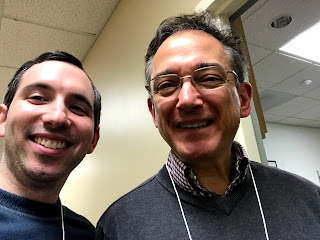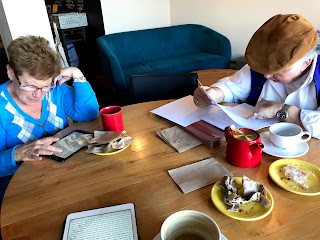Rabbi Philip Weintraub
Congregation Agudas Israel
Parshat Lech Lecha
2017
PACIFIC OCEAN (NNS) -- The Sasebo-based amphibious dock landing ship USS Ashland (LSD 48) rendered assistance to two distressed mariners, Oct. 25, whose sailboat had strayed well off its original course.
The mariners, Jennifer Appel and Tasha Fuiaba, both from Honolulu, and their two dogs had set sail from Hawaii to Tahiti this spring. They had an engine casualty May 30 during bad weather but continued on, believing they could make it to land by sail.
Two months into their journey and long past when they originally estimated they would reach Tahiti, they began to issue distress calls. The two continued the calls daily, but they were not close enough to other vessels or shore stations to receive them.
On Oct. 24, they were discovered 900 miles southeast of Japan by a Taiwanese fishing vessel. The fishing vessel contacted Coast Guard Sector Guam who then coordinated with Taipei Rescue Coordination Center, the Japan Coordination Center, and the Joint Coordination Center in Honolulu to render assistance.
Operating near the area on a routine deployment, Ashland made best speed to the location of the vessel in the early morning on Oct. 25 and arrived on scene at 10:30 a.m that morning. After assessing the sailboat unseaworthy, Ashland crew members brought the distressed mariners and their two dogs aboard the ship at 1:18 p.m.
"I'm grateful for their service to our country. They saved our lives. The pride and smiles we had when we saw [U.S. Navy] on the horizon was pure relief," said Appel.
Appel said they survived the situation by bringing water purifiers and over a year's worth of food on board, primarily in the form of dry goods such as oatmeal, pasta and rice.
Once on Ashland, the mariners were provided with medical assessments, food and berthing arrangements. The mariners will remain on board until Ashland's next port of call.
"The U.S. Navy is postured to assist any distressed mariner of any nationality during any type of situation," said Cmdr. Steven Wasson, Ashland commanding officer.
Part of U.S. 7th Fleet's forward deployed naval forces out of Sasebo, Japan, Ashland has been on a routine deployment for the past five months as a ready-response asset for any of contingency.
http://www.navy.mil/submit/display.asp?story_id=103056
Can you imagine being lost at sea for weeks? Jennifer Appel and Tasha Fuiaba were prepared for a long journey, but not for the one they took! Abraham thought he was prepared, yet his journey had major ups and downs.
The Lord said to Abram, Go forth from your native land and from your father's house to the land that I will show you.
2 I will make of you a great nation,
And I will bless you;
I will make your name great,
And you shall be a blessing.
3 I will bless those who bless you
And curse him that curses you;
And all the families of the earth
Shall bless themselves by you." http://www.jtsa.edu/lekh-lekha-torah
Abraham’s journey begins in the footsteps of his father. Terach leaves his home with his family, with Avram and Sarai. They journey from Ur to Haran, towards Canaan, but they do not make it all the way. Looking at our own histories, I think about the generations of Jews who desired to go to Israel. They wanted to make aliyah, but it was simply not possible. Think about your parents, grandparents, and beyond. What brought them to this country? They began a journey, but did they finish it?
 |
| Map from bible-history.com |
My grandparents were all born in New York, but their lives looked very different than mine. I grew up as the son of a doctor, reminded regularly that while he didn’t choose a lucrative speciality, we always lived comfortably. My paternal great grandfather had a newspaper stand, working in every sort of weather, every day of the week. He might go to an early minyan Saturday morning, but then he had to work on Shabbat, as much as he didn’t want to. My paternal grandfather worked for the NY state Department of Labor. It was not the most interesting job, but he took care of his family. To take care of my aunt, he worked weeknights teaching English as a foreign language, and took many other side jobs to make ends meet. My maternal grandfather worked with his hands. He could see the beauty and potential in many things, fixing, cleaning, and reselling what to others was junk. (Of course, at home, he had no tolerance for junk and regularly cleaned house, to the chagrin of my grandmother.) They did not necessarily love their work, but it enabled their children to make different choices. They strongly encouraged education, pushing their children to succeed in the fields of THEIR choice.
What happened to Abraham? He went to Israel and immediately had to go down to Egypt. He did some pretty embarrassing things in trying to convince people that Sarah was his sister--out of fear that they would kill him to take her as their wife. He and Sarah came out of that experience with great wealth and moved to the Negev with Lot--where there were squabbles amongst their entourages and they had to part ways. He helped out in a war, bringing peace and more success to himself and his family. Yet one big piece was missing--children. He had been promised a covenant through generations, yet did not have another generation to share his connection and love. Taking things into their own hands, Sarai gave him Hagar and Ishmael was born. A new covenant was sealed with Brit Milah and next week we find out what happens next.
Their journey is far from over! Powerful in this narrative is the intergenerational dynamics. We will eventually see how Isaac and Jacob will continue to fulfill the covenant. We will see how this leads directly to Joseph, slavery and the Exodus, which brings us to the Torah and Judaism.
Each of these family members was a step in the chain of tradition. We are also a part of that chain. Our parents were. Our children are. We have the stories of the generations in our blood--both those common to all of us as Jews AND those unique to our families.
Central to this story is resilience. Whether Abraham or ourselves, life has never been easy. We may be privileged. We may be lucky and fortunate to be educated and have enough to eat. Yet no life is without pain. No life is without challenge. The real test is how we deal with it.
According to tradition, Abraham had ten tests. Each was an opportunity to show connection to God or not. It was an opportunity it show strength or not. It was an opportunity to choose life or not. Each time, through every struggle, Abraham found ways of continuing. He even managed to offer thanks to God for all of his challenges and opportunities.
It makes me think about ourselves and our families. What is our reaction to struggle? Is it grit? Is it stick-to-it-ness or do we call it a day when things get hard? More books have been written than I can quote on the subject, but resilience and determination is the answer to almost every question. Our survival has been dependent on that. We can thank God both for the blessings and challenges of our lives, but more importantly we can thank God for the strength to get through, to push on, to live.
Talking to people who have experience loss, meaning everyone, the common thread is the desire to keep going, to put one foot in front of another. This is not to say that grief and loss are ignored, but that we must still find ways to live, to celebrate, to see the blessings of our lives. Like Abraham, we must follow the footsteps of our ancestors, but continue the journey to our own destinations. Like those two sailors, even when they lost their way, they kept plugging along, until they were rescued. (Sometimes we all need a little help!) They may not always be exactly where we thought we were going, but through positive reactions, resilience, grit, and faith in God, we can find the strength to discover our own Promised Lands. Lech lecha!










